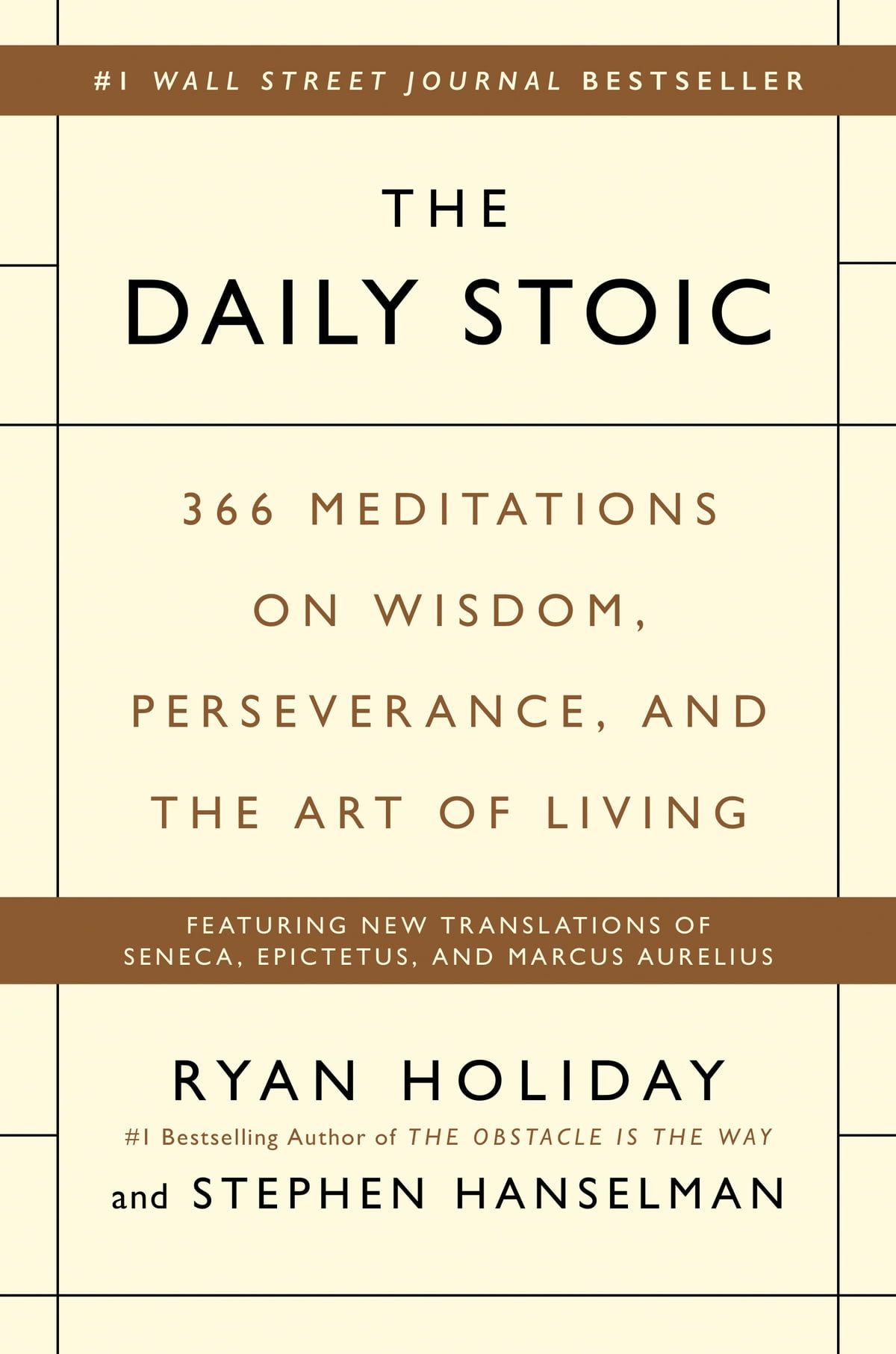The Daily Stoic by Ryan Holiday — Book Summary and Notes
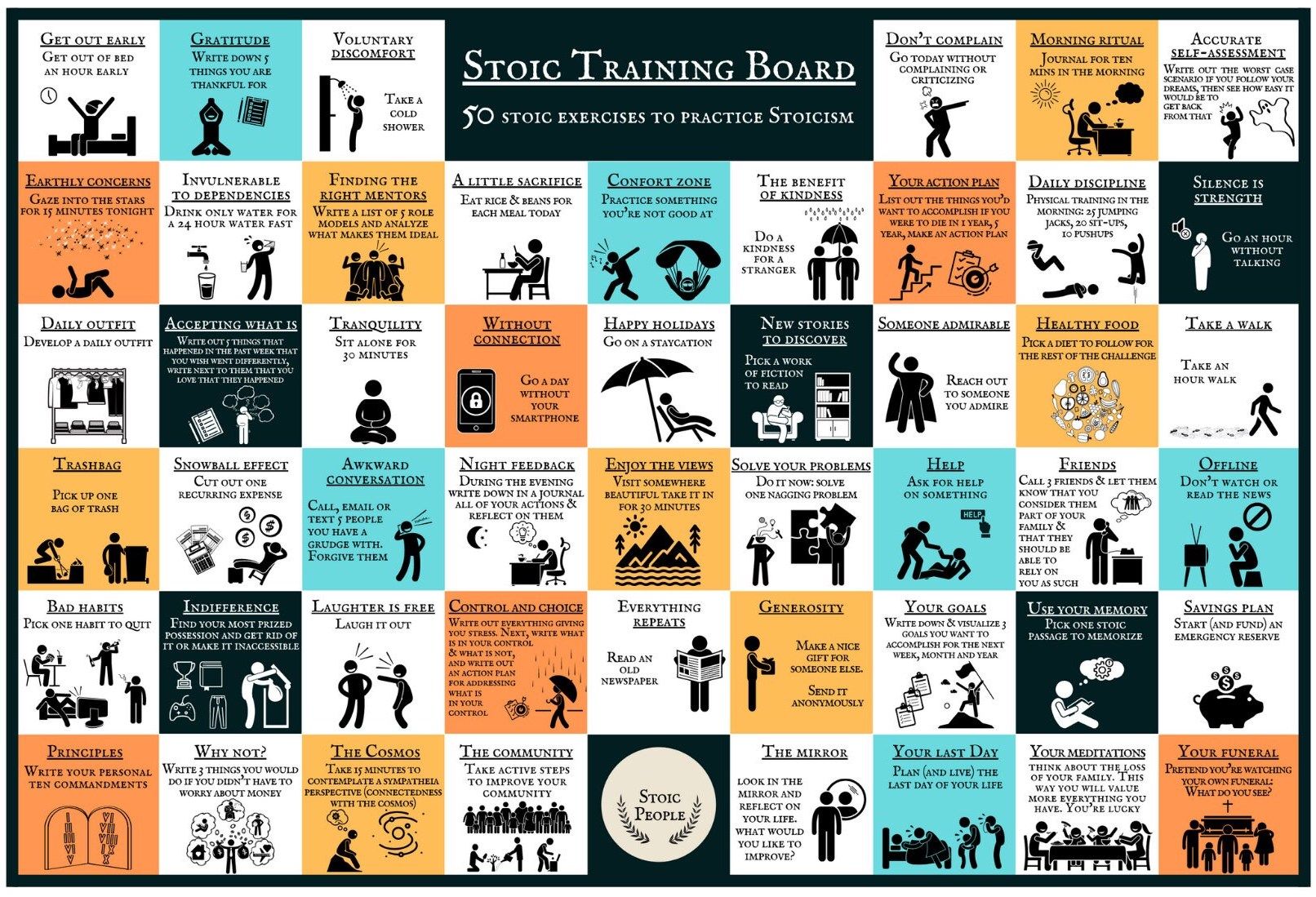
Four Habits of the Stoic Mind
- Accept only what is true.
- Work for the common good.
- Match your needs and wants with what is in our control.
- Embrace what nature has in store for us.
Why Stoicism Matters
Practiced by the rich and the impoverished, the powerful and the struggling alike in pursuing the Good Life. The Stoics were pioneers of the morning and nightly rituals: preparation in the morning, and reflection in the evening.
At the heart of The Daily Stoic is the philosophy of Stoicism. This school of thought emphasizes the four cardinal virtues: Wisdom, Temperance, Justice, and Courage. Marcus Aurelius, the Roman emperor, was a firm believer in Stoicism and his writings reflect his commitment to this philosophy. He believed that by understanding the nature of reality, one could free oneself from the worries of life and live in harmony with the universe.
“What have all these great men and women found within Stoicism that others missed? A great deal.” — Ryan Holiday
Three Disciplines of Stoicism
- The Discipline of Perception: how we see the world around us.
- The Discipline of Action: the decisions and actions we take and to what end.
- The Discipline of Will: how we deal with the things we cannot change, attain clear and convincing judgment, and come to a true understanding of our place in the world.
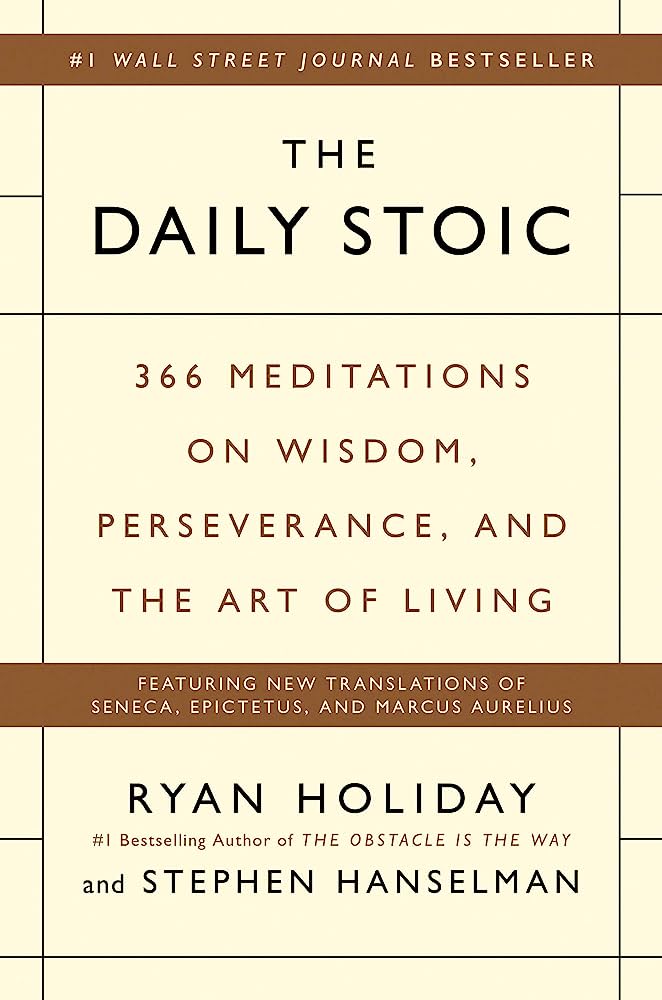
The Daily Stoic
By Ryan Holiday
The Discipline of Perception
1. Clarity
- The single most important practice in Stoic philosophy is differentiating between what we can change and what we can’t.
- Education—reading and meditating on the wisdom of great minds—is not to be done for its own sake. It has a purpose.
- Knowledge—self-knowledge in particular—is freedom.
- One of the hardest things to do in life is to say ‘No.’
- The more you say no to the things that don’t matter, the more you can say yes to the things that do.
- All you need are these: certainty of judgement, action for the common good, and an attitude of gratitude in the present moment for anything that comes your way.
- Having an end in mind is no guarantee that you’ll reach it—no Stoic would tolerate that assumption—but not having an end in mind is a guarantee you won’t.
- Have you taken the time to get clarity about who you are and what you stand for?
- You must reclaim the ability to abstain because within it is your clarity and self-control.
- You don’t control the situation, but you control what you think about it.
- Every single thing that is outside your control—the outside world, other people, karma—still presents a corresponding area that is in your control.
- You’ve got just one thing to manage: your choices, your will, and your mind. So mind it.
- Man is pushed by drives but pulled by values.
- Tranquility: “believing in yourself and trusting that you are on the right path, and not being in doubt by following the myriad footpaths of those wandering in every direction.”
- Ask yourself: Is this really the best way to do it? Know why you do what you do—do it for the right reasons.”
- Just begin the work. The rest follows.
- There is clarity (and joy) in seeing what others can’t see, in finding grace and harmony in places others overlook.
- Whoever we are, wherever we are—what matters is our choices. What are they? How will we evaluate them? How will we make the most of them? Those are the questions life asks us, regardless of our station.
- What happened yesterday—what happened five minutes ago—is the past. We can reignite and restart whenever we like.
- The more things we desire and the more we have to do to earn or attain those achievements, the less we actually enjoy our lives—and the less free we are.
- “Take a good hard look at people’s ruling principle, especially of the wise, what they run away from and what they seek out.” — Marcus Aurelius, Meditations, 4.38
- “At every moment keep a sturdy mind on the task at hand… You can do this if you approach each task as if it is your last.” — Marcus Aurelius, Meditations, 2.5
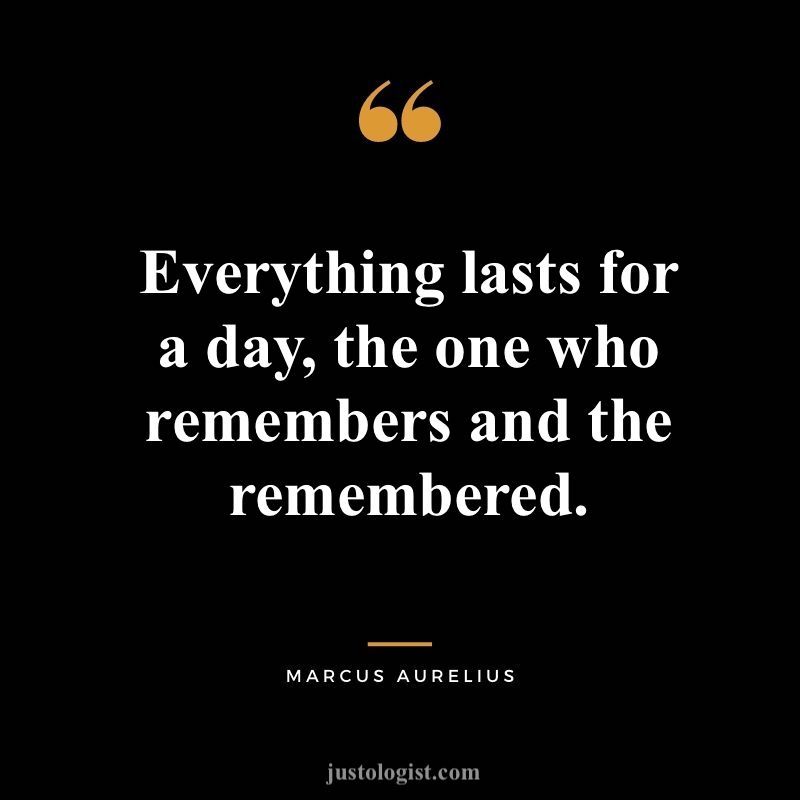
Seven Clear Functions of the Mind:
- Choice—to do and think right.
- Refusal—of temptation.
- Yearning—to be better.
- Repulsion—of negativity, of bad influences, of what isn’t true.
- Preparation—for what lies ahead or whatever may happen.
- Purpose—our guiding principle and highest priority.
- Assent—to be free of deception about what’s inside and outside our control (and be ready to accept the latter).
2. Passions and Emotions
- Today, when you find yourself getting anxious, ask yourself: Why are my insides twisted into knots? Am I in control here or is my anxiety? And most important: Is my anxiety doing me any good?
- Think before you act. Ask: Who is in control here? What principles are guiding me?
- The next time you are afraid of some supposedly disastrous outcome, remember that if you don’t control your impulses, if you lose your self-control, you may be the very source of the disaster you so fear.
- The next time you find yourself in the middle of a freakout, moaning and groaning with flu-like symptoms, or crying tears of regret, just ask: Is this actually making me feel better? Is this actually relieving any of the symptoms I wish were gone?
- Here’s a funny exercise: think about all the upsetting things you don’t know about… What’s your reaction? You don’t have one because you don’t know about it.
- Practice the ability to have absolutely no thoughts about something—act as if you had no idea it ever occurred. Or that you’ve never heard of it before. Let it become irrelevant or nonexistent to you. It’ll be a lot less powerful this way.
- “Whenever you get an impression of some pleasure… guard yourself against being carried away by it. After that, bring to mind both times, first when you have enjoyed the pleasure and later when you will regret it and hate yourself. Then compare to those the joy and satisfaction you’d feel for abstaining together.” — Epictetus, Enchiridion, 34
- There is nothing so certain in our fears that’s not yet more certain in the fact that most of what we dread comes to nothing.
- Life (and our job) is difficult enough. Let’s not make it harder by getting emotional about insignificant matters.
- “Remember to conduct yourself in life as it is at a banquet… Does it pass you by? Don’t stop it. It hasn’t yet come? Don’t burn in desire for it, but wait until it arrives in front of you.” — Epictetus, Enchiridion, 15
- It is the privilege of the gods to want nothing. To want nothing makes one invincible—because nothing lies outside your control.
- When it comes to your goals and the things you strive for, ask yourself: Am I in control of them or are they in control of me?
- “I begin to speak only when I’m certain what I’ll say isn’t better left unsaid.” — Plutarch, Cato the Younger, 4
- Don’t set your heart on so many things. Train your mind to ask: Do I need this thing? What will happen if I do not get it? Can I make do without it?
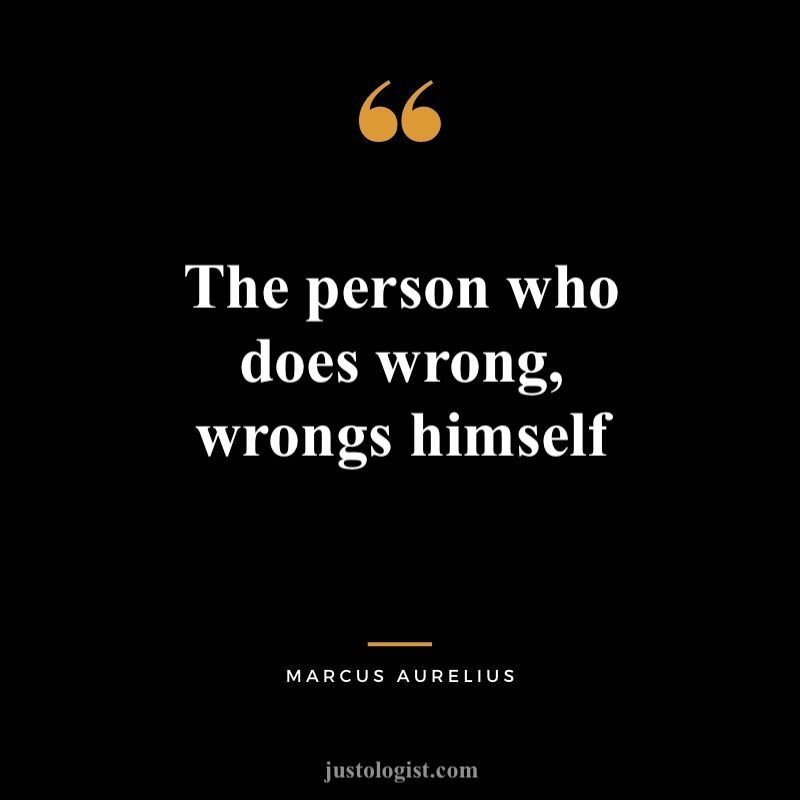
3. Awareness
- We have a choice: to stand with the philosopher and focus strenuously on the inside, or to behave like a leader of the mob, becoming whatever the crowd needs at a given moment.
- No slavery is more disgraceful than one which is self-imposed.
- As you walk past your possessions today, ask yourself: Do I need this? Is it superfluous? What’s this actually worth? What is it costing me?
- Listen and connect with people, don’t perform for them.
- “If a person gave away your body to some passerby, you’d be furious. Yet you hand over your mind to anyone who comes along, so they may abuse you, leaving it disturbed and troubled—have no shame in that?” — Epictetus, Enchiridion, 28.
- Maintain control over your mind and perceptions, they’d say. It’s your most prized possession.
- “You must choose whether to be loved by these friends and remain the same person or to become a better person at the cost of those friends.” — Epictetus, Discourses, 4.2.1; 4-5
- “Whenever someone has done wrong by you, immediately consider what notion of good and evil they had in doing it.” — Marcus Aurelius, Meditations, 7.26
- Ego and self-deception are the enemies of the things we wish to have because we delude ourselves into believing that we already possess them.
- Yesterday’s the past, tomorrow’s the future, but today is a gift. That’s why it’s called the present.
- “There is nothing good or bad outside my own reasoned choice, and that we shouldn’t try to lead events but to follow them.” — Epictetus, Discourses, 3.10.18
- “Wherever you go, there you are.”
- Is there anything sadder than the immense lengths we’ll go to impress someone? We buy things we don’t need, to impress people we don’t like.

4. Unbiased Thought
- “Your mind will take the shape of what you frequently hold in thought, for the human spirit is colored by such impressions.” — Marcus Aurelius, Meditations, 5.16
- When we experience success, we must make sure that it doesn’t change us—that we continue to maintain our character despite the temptation not to.
- We lose very little by taking a beat to consider our own thoughts. Is this really so bad? What do I really know about this person? Why do I have such strong feelings here? Is anxiety really adding much to the situation?
- In fighting biases and preconceptions: “Ask yourself: “What haven’t I considered? Why is this thing the way it is? Am I part of the problem here or the solution? Could I be wrong here? Be doubly careful to honor what you do not know, and then set that against the knowledge you actually have.”
- The first and greatest task of the philosopher is to test and separate appearances, and to act on nothing that is untested.
- “Throw out your conceited opinions, for it is impossible for a person to begin to learn what he thinks he already knows.” — Epictetus, Discourses, 2.17.1
- “Every man I meet is my master at some point, and in that, I learn of him.” — Emerson
- “Don’t be a person of too many words and too many deeds.” — Marcus Aurelius, Meditations, 3.5
- “Do away with the opinion I am harmed, and the harm is cast away too. Do away with being harmed, and harm disappears.” — Marcus Aurelius, Meditations, 4.7
- Not good or bad, not colored with opinion or judgement, just are.
- Your attention is one of your most critical resources. Don’t squander it!
- To be rational today, we have to do just three things: First, we must look inward. Next, we must examine ourselves critically. Finally, we must make our own decisions—uninhibited by biases or popular notions.
- When you catch an elbow or an unfair blow today, shake off the pain and remind yourself: I’m learning. My sparring partner is learning too. This is practice for both of us—that’s all. I know a bit more about him or her, and from my reaction, they’re going to learn a little bit more about me too.”
- The more you question these scripts and the more your subject them to the rigorous test of your education, the more you’ll be your own compass.
- If your know what you believe and why you believe it, you’ll avoid poisonous relationships, toxic jobs, fair-weather friends, and any number of ills that afflict people who haven’t thought through their deepest concerns.

The Discipline of Action
5. Right Action
- A Stoic has not uniform and resembles no stereotype. They are not identifiable by look or sight or sound. The only way to recognize them? By their character.
- When you catch yourself wanting to condescendingly drop some knowledge that you have, grab it and ask: Would I be better saying words or letting my actions and choices illustrate that knowledge for me?
- You will only get one shot today… When someone asks you what you did yesterday, do you really want the answer to be ‘nothing’?
- “Reflect that you ancestors set up those trophies, not that you may gaze at them in wonder, but that you may also imitate the virtues of the men who set up them.” — Seneca, Moral letters, 98.13b
- Our intention is not to be thanked or recognized, but to help and do what we think is right.
- Appreciate and take advantage of what you already do have, and let that attitude guide your actions.
- In our own journey to self-improvement, one never arrives. The sage—the perfect Stoic who behaves perfectly in every situation—is an ideal, not an end.
- How you handle today is how you’ll handle every day. How you handle this minute is how you’ll handle every minute.
- “Philosophers warn us to not be satisfied with mere learning, but to add practice and then training.” — Epictetus, Discourses, 2.9.13-14
- What if, when it came to your reading and learning, you prioritized quality over quantity? What if you read a few great books deeply instead of briefly skimming all the new books?
- Today, not tomorrow is the day that we can start to be good.
- What is the more production notion of good luck? One that is defined by totally random factors outside your control, or a matter of probability that can be increased by the right decisions and the right preparation?
- Don’t spend much time thinking about what other people think. Think about what you think. Think instead about the results, about the impact, about whether it is the right thing to do.
- Evaluate what you are doing, why you are doing it, and where accomplishing it will take you. If you don’t have a good answer, then stop.
6. Problem Solving
- Reverse Clause: If we can’t do this, then perhaps we can try that. And if we can’t do that, then perhaps we can try some other thing.
- We have a choice: Do we focus on the ways we have been wronged, or do we use what we’ve been given and get to work?
- It takes courage to decide to do things differently and to make a change, as well as discipline and awareness to know that the notion of “Oh, but this looks even better” is a temptation that cannot be endlessly indulged either.
- If they can do it, why can’t I?
- Whatever happens, don’t add angry or negative emotions to the equation. Don’t react for the sake of reacting. Leave it as it is. Stop digging. Then plan your way out.
- Will you hear the wisdom of the world or drown it out with more noise?
- If you need help, comrade, just ask.
- Let’s not wish we could turn back time or remake the universe according to our preferences. Not when it would be far better and far easier to remake ourselves.
- The next time you face a political dispute or a personal disagreement, ask yourself: Is there any reason to fight about this? Is arguing going to help solve anything?
- Why do the wise have so few problems compared with the rest of us? First, the wise seem to manage expectations as much as possible. Second, the wise always consider both the best and worst-case scenarios. Third, the wise act with a reverse clause.
- How you handle even minor adversity might seem like nothing, but, in fact, it reveals everything.
- Hold yourself to a higher standard but not an impossible one. And forgive yourself if and when you slip up.
- Every impediment can advance action in some form or another.
7. Duty
- Do your job today. Whatever happens, whatever other people’s jobs happen to be, do yours. Be good.
- “The task of a philosopher: we should bring our will into harmony with whatever happens so that nothing happens against our will and nothing that we wish for fails to happen.” — Epictetus, Discourses, 2.14.7
- If doing good was easy, everyone would do it.
- The dates, the names, the places—they hardly matter. What matters is the moral.
- We’re not trying to ace tests or impress teachers. We are reading and studying to live, to be good human beings—always and forever.
- Whatever humble art you practice: Are you sure you’re making time for it? Are you loving what you do enough to make the time? Can you trust that if you put in the effort, the rest will take care of itself?
- Those who pick things up quickly are notorious for skipping the basic lessons and ignoring the fundamentals. Don’t get carried away. Take it slow. Train with humility.
- The answer to the question “Why did you do the right thing?” should always be “Because it was the right thing to do.”
- Just as you must not abandon your new path simply because other people may have a problem with it, you must not abandon those other folks either. Don’t simply write them off or leave them in the dust. Don’t get mad or fight with them. After all, they’re at the same place you were not long ago.
- The foundation of a free country is that the freedom to swing your fist ends where someone else’s nose begins.
- Forgive them; they are deprived of truth. They wouldn’t do this if they weren’t. Use this knowledge to be gentle and gracious.
- “Whenever disturbing news is delivered to you, bear in mind that no news can be relevant to your reasoned choice.” — Epictetus, Discourses, 3.18.1-2.
- “Some die on the first rungs of the ladder of success, others before they can reach the top, and the few that make it to the top of their ambition through a thousand indignities realize at the end it’s only for an inscription on their gravestone.” — Seneca, On the Brevity of Life, 20.
- Stoic joy comes from purpose, excellence, and duty.
8. Pragmatism
- We want things to go perfectly, so we tell ourselves that we’ll get started once the conditions are right, or once we have our bearings. When, really, it’d be better to focus on making do with how things actually are.
- The more you say, the more likely you are to blow past opportunities, ignore feedback, and cause yourself suffering.
- Silence is a way to build strength and self-sufficiency.
- Our pursuits should be aimed at progress, however little that it’s possible for us to make.
- You’re welcome to take all of the words of the great philosophers and use them to your own liking… The way to prove that you truly understand what you speak and write, that you truly are original, is to put them into practice.
- What things do you think have been holding you back that, in fact, can be a hidden source of strength?
- Even one minute without playing the blame game is progress in the art of living.
- If you give things more time and energy than they deserve, they’re no longer lesser things. You’ve made them important by the life you’ve spent on them.
- There is no rule that says financial success must mean that you live beyond your means.
- “No person has the power to have everything they want, but it is in their power not to want what they don’t have, and to cheerfully put to good use what they do have.” — Seneca, Moral Letters, 123.3.
- Today, you could try to increase your wealth, or you could take a shortcut and just want less.
- If you start something and right away feel yourself getting lazy and irritated, first ask yourself: Why am I doing this? If it really is a necessity, ask yourself: What’s behind my reluctance? Fear? Spite? Fatigue?
The Discipline of Will
9. Fortitude and Resilience
- We are always preparing for what life might throw at us—and when it does, we’re ready and don’t stop until we’ve handled it.
- Your hidden power is your ability to use reason and make choices, however limited or small.
- There is nothing to fear but fear itself.
- It is precisely in times of immunity from care that the soul should toughen itself beforehand for occasions of greater stress.
- Anyone can get lucky, not everyone can persevere.
- The Stoic does two things when encountering hatred or ill opinions in others. They ask: Is this opinion inside my control? If there is a chance for influence or change, they take it. But if there isn’t, they accept this person as they are (and never hate a hater).
- The next time you make a donation to charity, don’t just think about the good turn you’re doing but take a moment to consider that one day you may need to receive charity yourself.
- Make yourself invulnerable to your dependency on comfort and convenience, or one day your vulnerability might bring you to your knees.
- Take a day off from work every now and then, but not a day off from learning.
- Power doesn’t corrupt, it reveals.
- No matter what’s happening to your body, no matter what the outside world inflicts on you, your mind can remain philosophical.
10. Virtue and Kindness
- Some people put their money in assets… Others invest in relationships or accomplishments… But a third type, Seneca says, invests in themselves—in being a good and wise person.
- That which doesn’t harm the community can’t harm the individual.
- “Better to trip with the feet than with the tongue.” — Zeno, Lives of the Eminent Philosophers, 7.1.26
- Rejoice in all their successes and be moved by their every failure.
- “The person who does wrong, wrongs himself.” — Marcus Aurelius, Meditations, 9.4
- We go through our days responding and reacting, but it’s rare to really pause and ask: Is this thing I’m about to do consistent with what I believe? Or, better: Is this the kind of thing the person I would like to be should do?
- If you have to preface your remarks with indicators of honesty or directness, what does that say about everything else you say?
- “The best way to avenge yourself is to not be like that.” — Marcus Aurelius, Meditations, 6.6
- If you meet other people’s dishonesty with the dishonesty of your own, guess what? You’re proving them right— now everyone is a liar.
- A virtuous person is generous with assumptions: that something was an accident, that someone didn’t know, that it won’t happen again.
- Everyone deserves to benefit from “philosophy’s principles” as Seneca puts it. If you see someone who is in need of help, or has asked for guidance, provide it. You own them that much.
- When a bad habit reveals itself, counteract it with a commitment to a contrary virtue.
- Instead of wasting even a second considering the opinions of future people focus every bit of yourself on being the best person you can be in the present moment.
- Let’s not confuse getting better at stuff with being a better person.
- Goodness isn’t something that’s going to be delivered by mail. You have to dig it up inside your own soul. You find it within your own thoughts, and you make it with your own actions.
- Ask yourself: What is it that only I can do? What is the best use of my limited time on this planet?
- “Each person acquires their own character, but their official roles are designed by chance. You should invite some to your table because they are deserving, others because may come to deserve it.” — Seneca, Moral Letters, 47.15b.
- “Aren’t you ashamed to reserve for yourself only the remnants of your life and to dedicate to wisdom only that time can’t be directed to business.” — Seneca, On the Brevity of Life, 3.5b.
11. Acceptance (Amor Fati)
- Instead of simply accepting what happens, [the Stoics] urge us to actually enjoy what has happened—whatever it is. Nietzsche, many centuries later, coined the perfect expression to capture this idea: amor fati (a love of fate). It’s not just accepting, it’s loving everything that happens.
- No matter how much preparation, no matter how skilled or smart we are, the ultimate outcome is in the lap of the gods.
- You’re just like the people who came before you, and you’re but a brief stopover until the people who are just like you will come after.
- Never complain, never explain.
- Acceptance isn’t passive. It’s the first step in an active process toward self-improvement.
- No man steps in the same river twice.
- “Cease to hope and you will cease to fear; for hope is accompanied by fear.” — Seneca, Moral Letters, 5.7b-8.
- “Fortune falls heavily on those for whom she’s unexpected. The one always on the lookout easily endures.” — Seneca, On Consolation To Helvia, 5.3.
- Always shun that which makes you angry.

12. Meditation on Mortality
- “The one who puts the finishing touches on their life each day is never short of time.” — Seneca, Moral Letters, 101.7b-8a
- Remove your expectations, your entitlements, and your sense of having been wronged. Find the positive in the situation, but also sit with your pain and accept it, remembering that it is part of life. That’s how one conquers grief.
- A philosopher knows that their default state should be one of reflection and inner awareness.
- Do we treat the days of our lives like we treat money? Because we don’t exactly know how many days we’ll be alive, and because we try our hardest not to think about the fact that someday we’ll die, we’re pretty liberal with how freely we spend our time. We let people and obligations impost on that time, only rarely asking: What am I getting in return here?
- Life is long if you know how to use it.
- “Many times an old man has no other evidence besides his age to prove he has lived a long time.” — Seneca, On Tranquility of Mind, 3.8b.
- How long have you been alive? What do you have to show for all of them?
- “Everything lasts for a day, the one who remembers and the remembered.” — Marcus Aurelius, Meditations, 4.35.
- The purpose of all our reading and studying is to aid us in the pursuit of a good life (and death). At some point, we must put our books aside and action. So, as Seneca put it, “words become works”.
